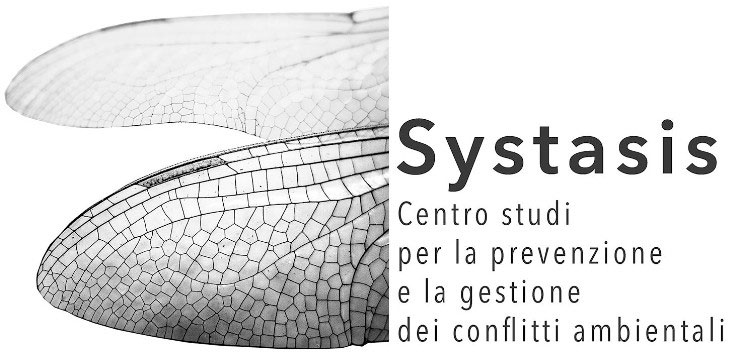GROMADA
Il progetto multi-partner “Gromada”, finanziato attraverso lo schema europeo Erasmus + e in corso per due anni da dicembre 2023 a novembre 2025, risponde alle conseguenze ambientali della guerra in Ucraina coinvolgendo gli istituti di istruzione superiore europei (IIS) per sostenere la capacità civile ucraina di ripresa in ambito ambientale. In questo modo, GROMADA intende creare un modello per gli IIS europei per diventare più socialmente responsabili e attivi nel rispondere alle crisi umanitarie e ambientali. Gromada è al centro del mandato di Systasis di promuovere la conoscenza del diritto ambientale, degli strumenti e delle soluzioni alternative per prevenire e risolvere i conflitti ambientali e dei relativi diritti umani.
In particolare, il progetto intende:
integrare il monitoraggio civico e la scienza civica ambientale, la cooperazione tra avvocati e comunità ucraine e una strategia per l’impegno civico come elementi chiave della ripresa ambientale dell’Ucraina. Utilizzando metodi di apprendimento innovativi e coinvolgenti, i partner del progetto svilupperanno lezioni e risorse online specificamente adattate alle esigenze del personale universitario e degli studenti. In questo modo, il progetto rafforza la capacità delle università europee di adempiere alla loro missione educativa e sociale, promuovendo la cittadinanza ambientale, soprattutto nelle comunità colpite da conflitti;
promuovere la consapevolezza di un ambiente sano come diritto umano essenziale per la ripresa dell’Ucraina. Il progetto rafforza inoltre l’importanza della partecipazione pubblica in risposta alla triplice crisi dell’inquinamento, della perdita di biodiversità e dei cambiamenti climatici, tutti esacerbati dalla guerra. Il diritto di accedere a informazioni accurate sullo stato dell’ambiente è un pilastro fondamentale della democrazia ambientale. Questo diritto può essere particolarmente a rischio durante i conflitti e il progetto affronterà questo rischio;
sviluppare competenze attraverso il monitoraggio civico e la scienza civica per sostenere le comunità colpite dai conflitti nella protezione del loro patrimonio naturale e nella promozione della responsabilità ambientale. Queste competenze sono direttamente trasferibili ad altre iniziative comunitarie volte a monitorare gli sforzi delle autorità per adattarsi alle future sfide ambientali in Ucraina. Ciò sostiene anche i piani per incoraggiare la transizione energetica dell’Ucraina lontano dai combustibili fossili;
riunire gli IIS europei, un partner d’impresa e una ONG specializzata, che sono impegnati collettivamente nel rafforzamento delle capacità legali e sociali per sostenere il pieno godimento dei diritti ambientali in Ucraina. Ciò consentirà agli IIS europei di sostenere la cittadinanza attiva e di promuovere i valori dell’UE, rispondendo al contempo alla necessità degli IIS europei di rafforzare la cooperazione tra gli attori legali e le comunità per la cittadinanza ambientale e la costruzione della pace in Ucraina.
L’innovatività del progetto consiste ne:
I) l’integrazione dei quadri giuridici e politici ambientali in collaborazione con le comunità locali attraverso innovazioni aperte in scenari di guerra e post-bellici;
II) la responsabilizzazione del personale accademico, degli studenti e delle comunità locali per coinvolgere il pubblico e fare advocacy per la scienza civica ambientale e la costruzione della pace;
III) l’adozione di un approccio transnazionale e intersettoriale che può facilitare la condivisione delle conoscenze e il trasferimento delle migliori pratiche tra diversi Paesi e regioni, portando in ultima analisi a attività di recupero ambientale più efficaci ma anche più specifici per il contesto.
TEAM OPERATIVO
Avv. Veronica Dini
Avvocato ambientale, Veronica Dini ha conseguito il titolo di avvocato nel 2002. È titolare dello Studio Legale omonimo dal novembre 2003 e si occupa, in particolare, di diritti civili e diritto dell’ambiente:
- diritto e tutela dell’ambiente (tutela dell’ambiente e del paesaggio, autorizzazioni ambientali, danno ambientale, bonifica dei siti contaminati, energie rinnovabili, due diligence ambientali, audit);
- diritto dell’edilizia urbanistica (titoli abilitativi, espropri per pubblica utilità, grandi opere);
- diritto penale ambientale e d’impresa (responsabilità degli Enti ex D.Igs. 231/2001 e s.m.i., modelli organizzativi e ODV, reati contro la Pubblica Amministrazione, due diligence);
- tutela della proprietà e gestione dei beni comuni e confiscati alla criminalità organizzata;
- tutela penale della sicurezza e dell’igiene sui luoghi di lavoro, diritto penale del lavoro;
- partecipazione e facilitazione dei processi decisionali inclusivi (valutazione ambientale strategica, inchiesta pubblica, dibattito pubblico, accesso alla giustizia), mediazione dei confitti ambientali.
Patrocina nell’ambito di contenziosi di natura penale, civile e amministrativa, anche nelle giurisdizioni superiori.
È docente a contratto presso Università Cattolica di Milano, l’Università degli Studi di Milano e il Politecnico di Milano. Interviene frequentemente qualità di relatore a conferenze, workshop e corsi di formazione in diritto ambientale e penale del lavoro. L’avv. Dini è inoltre Presidente dell’Associazione culturale Circola – cultura, diritti e idee in movimento.
Anna Berti Suman
Anna Berti Suman è ricercatrice principale del progetto “Sensing for Justice“, che indaga il potenziale del monitoraggio civico come fonte di prove per la giustizia ambientale e come strumento per promuovere la mediazione ambientale. Il progetto è stato ospitato dal Centro Comune di Ricerca della Commissione Europea, e sostenuto dal finanziamento europeo Marie Skłodowska-Curie Individual Fellowship e dal Consiglio Olandese per la Ricerca. Al momento, Anna collabora con Systasis – Centro Studi per la Prevenzione e Gestione dei Conflitti Ambientali, Milano, in particolare in materia di conflitti emergenti e prove civiche del danno ambientale. In precedenza, Anna ha guidato il progetto di dottorato “Sensing the Risk” presso il Tilburg Institute for Law, Technology & Society, analizzando come il monitoraggio civico influenzi la governance del rischio ambientale. Anna è anche avvocato abilitato in diritto dell’ambiente e del clima presso l’Ordine degli Avvocati di Roma. In precedenza, ha lavorato come avvocato per Greenpeace International, Amsterdam, e per l’Associazione delle persone colpite dalla Chevron-Texaco, Ecuador. Anna si è laureata in Giurisprudenza presso l’Università di Bologna, con specializzazione in diritto transnazionale presso l’Università di Ginevra, dopo una ricerca sui conflitti per l’accesso all’acqua in Cile.
